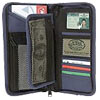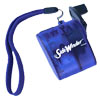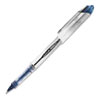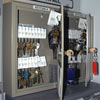|
|
|
Less Stress Look, I can't possibly help you with the stress of being fired from your job, getting served with a subpoena, moving to a new house, discovering your teenage kid has a tattoo, dealing with a living autopsy tax audit, or any similar thing. But I sure can help you become a better "Boy Scout," able to deal with the little "emergency" events that'll inevitably come your way. Because it's the little things that, taken together, often push us over the edge.
Minimizing everyday stress takes a combination of good habits, the right "equipment" and the right attitude. Good habits translate to good routines. The root cause of most stress is lack of control. You feel as if you can't control your environment, the course of events, or the actions of other people. Not much we can do about those other people, but you have tremendous control over your personal space. If you invest the time to create good order and some organization in your home, car, and workplace, you'll be repaid with a host of benefits. When things are where you expect them to be, are in good supply and working order, then you save both time and aggravation. Developing the habits of always putting things away in the same place, labeling storage boxes so you can find what's in them, and following a schedule (for completing recurring tasks) will pay you back with increased free time and less accumulating stress. Equipment means having the everyday things you need, when you need them. For example, if you have the storage space, why not lay in a huge supply of non-spoiling necessities such as toilet paper, diapers and infant formula, toothpaste, feminine hygiene products, et cetera? This stuff doesn't go bad, but running out always creates a mini-emergency. I'll have other examples in the stress survival kit list. The right attitude means not freaking out when things go awry. If you know that, inevitably, the milk will spill, traffic will back up, the kids will get sick, extra work will land on your desk when you're least able to handle it… you're better able to maintain PMA (Positive Mental Attitude). It enables you to say to yourself, "Been here before. Handled it then. Will handle it just fine now." Whether that's real or just a psychological placebo effect doesn't matter. Your positive outlook will help convert the "crisis" into just another event. Stress Reduction Kit Emergency Money. Although we live in a virtually cashless society, having some green around still comes in very handy at times. That's why you should have an envelope containing $500 in these denominations: Four $50's (for bribes), ten $20's, ten $5's, and fifty $1's. Plus two rolls of quarters. You should also have an emergency credit card with a high limit. Forget about travelers checks. Nobody uses them anymore. Prepacked Suitcase. You never know when you'll need to leave town on very short notice. Having a mostly-packed rollaboard will make this rapid departure much easier and faster (and therefore less stressful). No reason not to have one prepacked with underwear, PJ's, other non-wrinkling clothing, toiletries, shaver, etc.
Bug-out Bag. This is different than a prepacked suitcase. In the event of a natural or manmade disaster, you may need to leave the house within minutes. Your bug-out bag should be in the front coat closet or a place where you can quickly grab it on the way out. It should contain (at a minimum) two days of warm, comfortable clothing ready to go. Include toiletries, medicines, and copies of important documents, phone lists, etc. Raingear and some non-perishable food is a big plus for your kit. For complete info, see my survival article from the June 2003 issue. Spare Pair of Eyeglasses. Glasses get broken or lost. Expect this. Avoid a crisis by having a good extra pair available, especially if you "Need your glasses to find your glasses…" The same general advice for spares applies to house & car keys, garage door opener, etc.
3x5 Cards. Lists dramatically reduce stress. I have a PDA, but make all my to-do lists, shopping lists, reminder notes, etc. on 3x5 cards. There's something very satisfying about physically crossing a completed task off the list. Plus, the simple act of writing things down brings organization and clarity to your day. It also enables you to see what's high priority and what isn't.
Insurance Policies. The original peace-of-mind product. People say they don't like insurance. Actually, they just hate paying for it. Your call. Personally, I consider good policies from top companies an essential part of my stress reduction kit. Of course, you need auto, homeowner, and health insurance. However, most people are way underinsured when it comes to life, disability, and long-term-care. If you have substantial assets, get a multi-million dollar liability "umbrella" policy. You'll be surprised how cheap it is. Also consider special coverage for your expensive electronics, jewelry, collectibles, etc. It may not be a "super good deal" economically, until you factor in the peace-of-mind collateral benefit. Life Documents. You have a last will, right? What about trust documents for your kids, health care proxy/living will, letters of instruction expressing your wishes, a master list of assets and important document locations, and so forth? All up to date? I thought not. Now would be a good time to schedule that meeting with your lawyer to review your documents. You can't have peace-of-mind without all this in good order. Other Documents. In addition to the above: passports (non-expired), copies of kids' birth certificates, marriage license, photocopies of wallet contents, auto registration and insurance card, etc. Also, a "Black Book" with full contact info for friends, family, service providers, doctors, professionals, etc. Extra points if you keep documents in a fireproof safe. Complete Data Backup for all computers and PDA's. Your hard disk will crash. You will accidentally erase something important. Your computer may get stolen. Therefore, you MUST perform regular backups of your data and keep the backup media someplace safe. Off-site preferably (office to home and vice-versa).
Security System. Maybe I've been watching too many TV commercials, but that "blanket of security" granted by a good perimeter burglar alarm system is very comforting. A good system isn't cheap, but will work reliably (false alarms are very stressful), and protect you from smoke, fire, gas leaks, and carbon monoxide. By the way, make sure you have clear written/pictorial instructions for turning off gas, electric, water in an emergency. Also, please have a *working* fire extinguisher on each level of your house (frighteningly, a quarter of all home extinguishers have lost their charge.) List of Trusted Home Service People. Plumber, electrician, heating/air conditioning service, exterminator, tree surgeon, sprinkler, alarm, appliance repair, etc. Compile this list before you need it. Check with neighbors if you need to fill in any blanks. Keep the list handy, perhaps posted inside a kitchen cabinet near the phone. Corded Telephone. Make sure there's always one reliable phone in your home. Many people found out the hard way during the last big blackout that cordless phones stop working and cell circuits get jammed. Meanwhile, a twenty-dollar corded phone kept working. Gift Collection. Gift giving should be a pleasure. Often it's not. We scramble to buy "something" at the last minute. Birthday and anniversaries are easy to plan for. Why wait? Always be in shopping mode. When you see something cool and reasonably priced, buy it… even if you're not sure who it's for yet. Have an assortment of small wrapped gifts (with contents written on attached Post-it's) to bring when you're invited to someone's home for dinner, for "Hallmark" holidays, etc. (No "regifting" allowed.). Also, lay in a good stock of cards: birthday (child and adult), anniversary, condolence, and get well. If you have an hour to kill between appointments, stop into a card shop and buy a couple of dozen that you like. Miscellaneous Stress Reducers
I'm sure you have some things you could add to this list… things that are part of your personal stress reduction kit (whether you call it that or not). Please share them with me. |

 No magic here. Just some common sense. Here's a great
example: a two dollar brass hook from the hardware store
can permanently eliminate a stressor from your life. If
you take that hook and screw it to the wall by your
front door (or just inside the coat closet), and always
hang your keys upon entering, you'll never go
through the "Where the #%!*~ are my keys!"
scramble again.
No magic here. Just some common sense. Here's a great
example: a two dollar brass hook from the hardware store
can permanently eliminate a stressor from your life. If
you take that hook and screw it to the wall by your
front door (or just inside the coat closet), and always
hang your keys upon entering, you'll never go
through the "Where the #%!*~ are my keys!"
scramble again.  Travel
Document Organizer. Traveling is stressful enough
all by itself. It's made worse when you can't locate the
essential stuff. Be good to yourself and get an
organizer for your tickets and travel papers. I like
this one from LL Bean.
Travel
Document Organizer. Traveling is stressful enough
all by itself. It's made worse when you can't locate the
essential stuff. Be good to yourself and get an
organizer for your tickets and travel papers. I like
this one from LL Bean. Extra
Cell Phone Battery. We're very dependant on our cell
phones, even in non-crisis situations. But their
universal weak point is the battery. Especially if your
battery is getting on in years, it may let you down when
you need it most. Consider a Zinc-Air single-use
emergency battery or
Extra
Cell Phone Battery. We're very dependant on our cell
phones, even in non-crisis situations. But their
universal weak point is the battery. Especially if your
battery is getting on in years, it may let you down when
you need it most. Consider a Zinc-Air single-use
emergency battery or  Writing
Implements. Make sure you have lots of pens all over
the house. Buy a couple of dozen at Staples and scatter
them everywhere. I like the Sanford uni-ball
Writing
Implements. Make sure you have lots of pens all over
the house. Buy a couple of dozen at Staples and scatter
them everywhere. I like the Sanford uni-ball  Key
Cabinet. How many different keys do you have? I had
no idea until I took stock. Counting all the different
door keys, padlock keys, desk keys, neighbors' keys, car
keys, luggage keys, etc., I was able to fill up two
30-key cabinets. With clearly labeled tags, you'll never
again play that "What's this key for?" game.
Key
Cabinet. How many different keys do you have? I had
no idea until I took stock. Counting all the different
door keys, padlock keys, desk keys, neighbors' keys, car
keys, luggage keys, etc., I was able to fill up two
30-key cabinets. With clearly labeled tags, you'll never
again play that "What's this key for?" game.